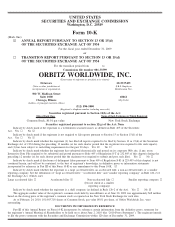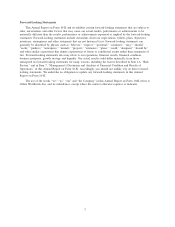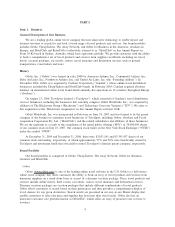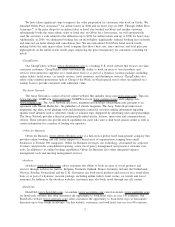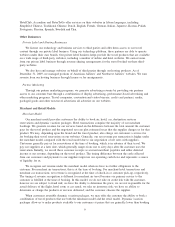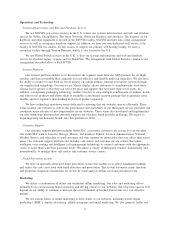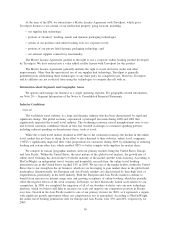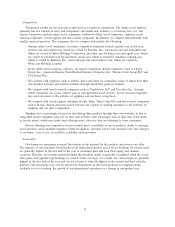Orbitz 2010 Annual Report Download - page 11
Download and view the complete annual report
Please find page 11 of the 2010 Orbitz annual report below. You can navigate through the pages in the report by either clicking on the pages listed below, or by using the keyword search tool below to find specific information within the annual report.Competition
The general market for travel products and services is intensely competitive. The online travel industry
generally has low barriers of entry and competitors can launch new websites at a relatively low cost. Our
current competitors include online travel companies, traditional offline travel companies, suppliers, travel
research companies, search engines and meta-search companies. In addition, we compete internationally with
smaller regional operators. The companies that we compete with include the following:
• Among online travel companies, our major competitors primarily include expedia.com, hotels.com,
hotwire.com and venere.com, which are owned by Expedia, Inc.; travelocity.com and lastminute.com,
which are owned by Sabre Holdings Corporation; priceline.com, bookings.com and agoda.com, which
are owned by priceline.com Incorporated; opodo.com, which is owned by Amadeus; rakuten.com,
which is owned by Rakuten, Inc.; and wotif.com and asiawebdirect.com, which are owned by
Wotif.com Holdings Limited.
• In the offline travel company category, our largest competitors include companies such as Liberty
Travel, Inc., American Express Travel Related Services Company, Inc., Thomas Cook Group PLC and
TUI Travel PLC.
• We compete with suppliers, such as airlines, hotel and rental car companies, many of which have their
own branded websites and toll-free numbers through which they generate business.
• We compete with travel research companies such as TripAdvisor LLC and Travelzoo Inc., through
which consumers can access content such as user-generated travel reviews. Travel research companies
also send customers to the websites of suppliers and our direct competitors.
• We compete with search engines including Google, Bing, Yahoo! and AOL and meta-search companies
such as Kayak. Search and meta-search websites are capable of sending customers to the websites of
suppliers and our direct competitors.
Suppliers have increasingly focused on distributing their products through their own websites in lieu of
using third parties. Suppliers who sell on their own websites offer advantages such as their own bonus miles
or loyalty points, which may make their offerings more attractive than our offerings to some consumers.
Factors affecting our competitive success include price, availability of travel products, ability to package
travel products across multiple suppliers, brand recognition, customer service and customer care, fees charged
to customers, ease of use, accessibility, reliability and innovation.
Seasonality
Our businesses experience seasonal fluctuations in the demand for the products and services we offer.
The majority of our customers book leisure travel rather than business travel. Gross bookings for leisure travel
are generally highest in the first half of the year as customers plan and book their spring and summer
vacations. However, net revenue generated under the merchant model is generally recognized when the travel
takes place and typically lags bookings by several weeks or longer. As a result, our cash receipts are generally
highest in the first half of the year and our net revenue is typically highest in the second and third calendar
quarters. Our seasonality may also be affected by fluctuations in the travel products our suppliers make
available to us for booking, the growth of our international operations or a change in our product mix.
11

